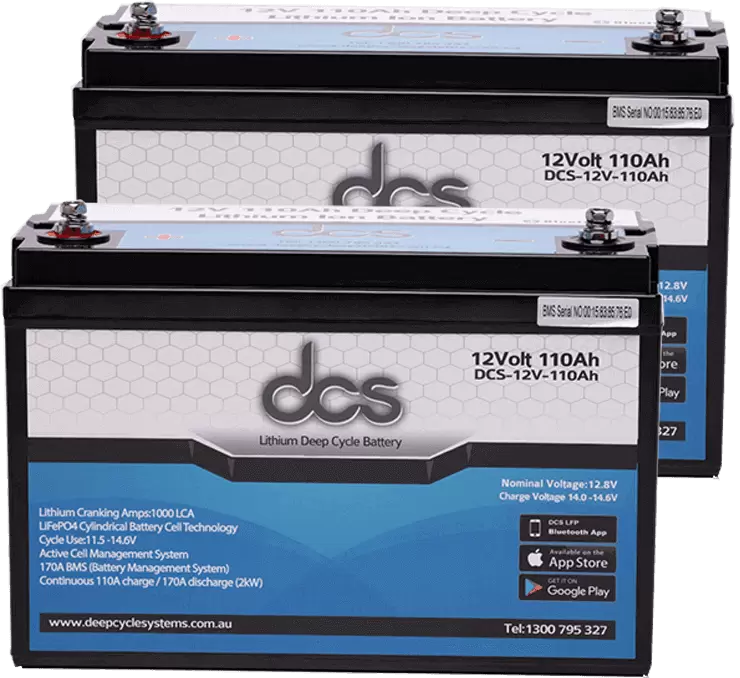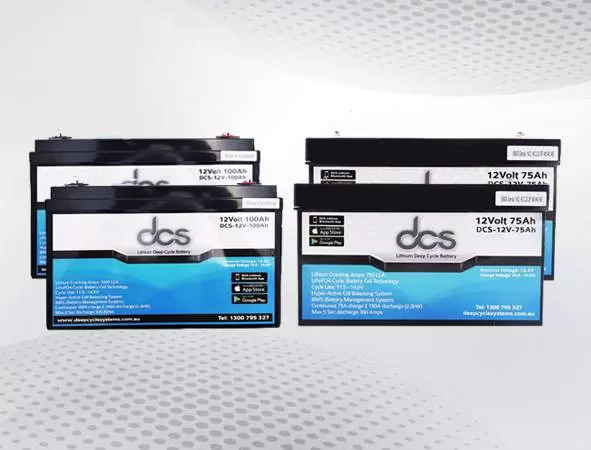What is the difference between lead-acid, lithium, and other technologies? They’re often used as the primary power source for smaller campers because they’re reliable and easy to maintain. Lithium batteries are newer than lead acid ones, but they’re quickly gaining popularity due to their improved performance.
Why should you Choose Lithium Battery for Caravan?
- Lithium Battery for Caravan are more efficient than lead-acid batteries. A lithium battery can store up to 40% more energy per pound than a comparable lead acid battery, meaning it can be lighter and smaller while providing the same amount of power as a larger lead acid battery (or even more).
- Lithium batteries have a longer life than lead-acid batteries. The lifespan of your car’s starter battery will vary depending on how much you use it and what type of vehicle you drive; however, most experts agree that lithium-ion batteries have an average lifespan of between three to five years before needing replacement, whereas lead acid ones typically last between one and two years before needing replacement. It means that if you’re looking for something that will last longer than most other types today, save money over time because they don’t need replacing as often!
What is the Difference between Lithium and Lead-Acid Batteries?
- Lithium batteries are the best technology that provides high-quality performance.
- Lithium batteries are the most efficient and long-lasting batteries in the world.
- Lithium batteries have a long life compared to lead-acid batteries.
- Lithium car battery prices are very reasonable and affordable
- Lithium batteries have a higher rate of discharge than lead-acid batteries.
- Lithium car battery prices are very good and affordable!
- Lithium batteries have a higher rate of discharge than lead-acid batteries. It means that lithium batteries can be discharged at a much faster rate without any damage to their performance or capacity.
- Lithium car battery prices are very reasonable and affordable!
Lead Acid Battery for Caravan
Lead acid batteries are the most common type of battery used in caravans, but they have some drawbacks. Although they’re relatively inexpensive, lead-acid batteries are heavy and bulky. In addition to that, they have a short lifespan; if you don’t maintain them properly (which requires regular maintenance), lead acid batteries can corrode quickly.
Lead acid batteries also have a low energy-to-weight ratio: lithium batteries can deliver more power per kilogram than lead acid ones at a lower cost per kilowatt hour (kWh). Lithium battery technology is advancing rapidly, too; each year brings new improvements that allow lithium cells to store more energy while remaining safe for use in vehicles or homes!
Lithium Car Batteries are Considered to be the best Technology
Lithium batteries are considered to be the best technology for powering your car. They offer many benefits over other types of batteries, including:
- Long life – Lithium batteries can be used for many years without losing their charge or power output.
- Lightweight – Lithium battery packs weigh less than lead-acid counterparts, making them easier to install in smaller vehicles like vans and trucks. They’re also easier to transport since they don’t require as much space as lead acid models when carried around by hand (or on a forklift).
- Efficiency – According to Battery University’s website, lithium-ion cells are about 40% more efficient than lead-acid batteries at storing electrical energy per unit weight; this means you’ll be able to take trips farther away from home without worrying about running out of juice halfway through your journey!

Benefits of Energising Your Caravan with Lithium Batteries
Lithium batteries are more environmentally friendly than lead-acid batteries because they do not contain toxic materials, such as sulfuric acid or lead oxide. They are also more efficient, lasting longer and having a longer lifespan than their counterparts. The lithium battery pack is a robust and reliable system that can be installed by a certified professional in the same location as your lead-acid battery (typically under the caravan). The life expectancy of this type of system is 10 years; however, it will depend on how much use it gets over time and how well you take care of your equipment throughout its lifespan. A 120-ah lithium battery can power an average 2kW caravan for 10 hours straight without recharging!
Understanding Lithium Batteries: How They Work
The benefits of lithium batteries include:
- They are safer and lighter than lead-acid batteries.
- They are also more efficient, meaning they can be charged faster and longer without damage or needing replacement.
- More power is available from lithium batteries, making them ideal for powering high-draw electronics such as laptop computers, cell phones or tablets in vehicles that do not have constant access to an electrical outlet (i.e., RVs). It means less time spent charging devices at campsites or rest stops along the way!
- Batteries are the heart of any electric vehicle; they provide the energy needed to move it forward through movement within its motor(s). If you’re looking for reliable performance from your EV’s battery system, look no further than Lithium Iron Phosphate (LiFePO4) technology!
Selecting the Right Lithium Battery for Your Caravan
Choosing the right battery for your caravan is essential. The size and power of a battery will depend on its capacity, voltage, physical dimensions, weight and cost. This article will examine common factors when choosing a lithium battery for your caravan technology.
Car batteries are lead-acid because they contain lead oxide plates immersed in sulfuric acid (electrolyte). These batteries have been around since the mid-19th century but have come under criticism recently due to their environmental impact during manufacture and disposal processes; this has prompted many manufacturers to look into other technologies, such as lithium-ion batteries which are lighter than traditional ones but can still provide enough power for today’s vehicles.
Installation and Integration of Lithium Batteries in Caravans
Before you can start the installation and integration of lithium batteries in your caravan, there are a few things that you need to know. First, you must understand how to connect the battery to the caravan. You must also know how long a lithium battery can charge fully and what precautions should be taken. If something goes wrong during charging or maintenance, it will affect your entire trip and endanger others on board with you.
Here are some tips on how best to maintain them:
- Charge these types of batteries only when necessary; overcharging them can cause damage
- Do not use chargers from another manufacturer (unless specifically recommended by their manufacturer) since they may cause damage due to differences in voltage ratings between brands
Maximising the Efficiency of Your Caravan’s Lithium Battery System
Lithium batteries are more efficient than lead-acid batteries, as they can be used for longer periods without needing to be charged. The life span of a lithium battery is also longer than that of a lead-acid battery, so you won’t have to replace your caravan’s lithium battery system as often as you would if it were made with lead-acid technology. Lithium batteries have been shown to have an energy density (amount of stored power) that is higher than other types of batteries; this makes them great options for powering electric vehicles such as RVs and cars because they can hold more power than other types of rechargeable batteries commonly used today such as nickel-cadmium or nickel metal hydride ones do!
Longevity and Maintenance of Lithium Batteries for Caravans
Lithium batteries have a long life. Lithium batteries are maintenance-free, so you don’t have to worry about checking the electrolyte levels in your battery or topping off the water level every couple of months like you would with lead-acid batteries. They are also lightweight and small, ideal for caravans or other small vehicles such as boats and RVs.
Lithium is a metal that’s found naturally in salt water, brines (salty underground water), clays and volcanic ash — but when it comes to powering our homes and vehicles, lithium isn’t mined; instead, it’s produced from its ore mineral “lithia” through an industrial process called electrolysis where pure oxygen gas is bubbled through molten lithium chloride solution which results in two products: solid lithium metal plus hydrogen gas (H2).
Safety Considerations and Precautions for 120ah Lithium Battery
Before we begin, let’s look at some safety considerations and precautions for 120ah Lithium Battery.
- Do not charge or discharge the battery pack at rates exceeding its maximum design rate (see datasheet).
- Do not short-circuit the battery pack or allow metal objects to contact its terminals while charged or discharged. Doing so may cause fire or explosion, leading to personal injury and property damage.
- Always use chargers designed specifically for lithium-ion batteries; do not use chargers designed for NiCad/NiMH batteries! Also, don’t try charging your batteries with car chargers or any other type of charger than what comes with your purchase from us here at Caravan Technology – doing so could result in serious injury due to overheating during charging cycles as well as damage caused by overcharging current levels exceeding recommended values which could lead ultimately result in permanent damage if left unchecked long enough – so please be careful out there!
FAQs
Q: What is lithium battery technology for caravans?
A: Lithium battery technology for caravans refers to using lithium-ion batteries as a power source for various electrical systems. These batteries offer several advantages over traditional lead-acid batteries, including higher energy density, longer lifespan, faster charging, and lighter weight.
Q: How does lithium battery technology work in caravans?
A: Lithium battery technology utilises lithium-ion cells to store and release electrical energy. These batteries consist of multiple cells connected in series and parallel configurations to achieve the desired voltage and capacity. Lithium batteries can power various devices such as lights, appliances, and entertainment systems when connected to a caravan’s electrical system.
Q: How do I charge a lithium battery in my caravan?
A: Charging a lithium battery in a caravan typically involves connecting it to an appropriate charger or power source. Lithium batteries require specific charging parameters, including voltage and current limits, which must be followed to ensure safe and efficient charging. It’s recommended to use chargers specifically designed for lithium batteries or consult the battery manufacturer’s guidelines for the correct charging procedure.
Conclusion
Lithium-ion batteries are the best choice for caravan owners who want to maximise the efficiency of their vehicles. They are lightweight and have a long lifespan, so you can use them for years without worrying about replacing them. This type of battery also has no memory effect, so it won’t lose its charge if left idle overnight or over long periods.



